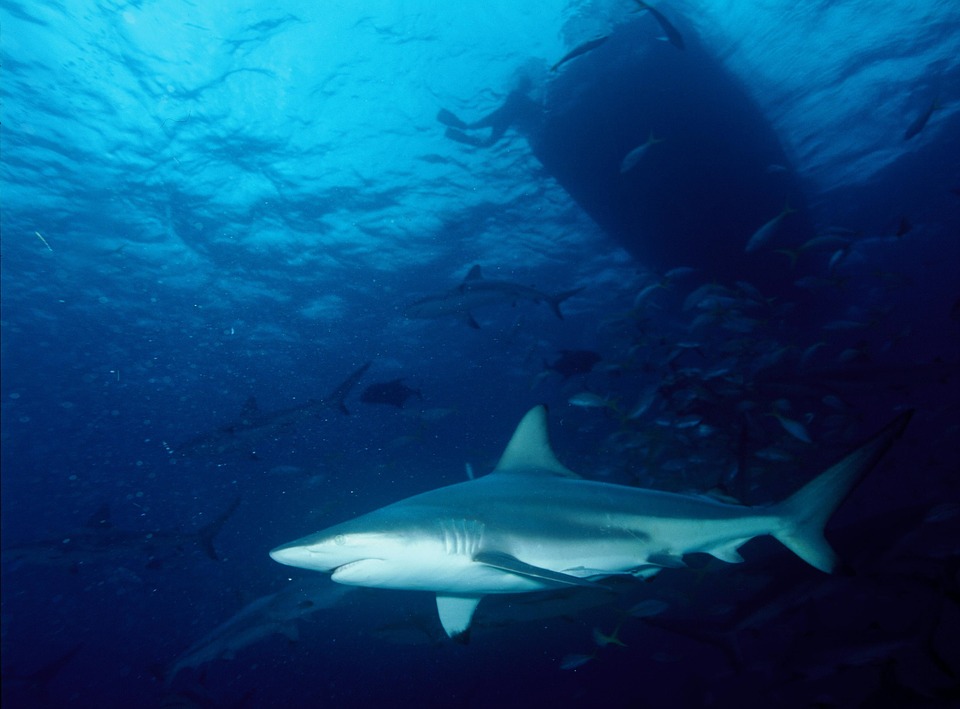WASHINGTON (Saving Seafood) – September 14, 2017 – A ban on shark fin sales in the United States would undermine some of the planet’s most sustainable shark fisheries while harming global shark conservation efforts, according to two prominent shark scientists.
In a paper published this month in Marine Policy, Dr. David Shiffman, a Liber Ero Postdoctoral Research Fellow at Simon Fraser University in Vancouver, B.C., and Dr. Robert Hueter, Director of the Center for Shark Research at Mote Marine Laboratory in Sarasota, Fla., call proposed Congressional legislation banning the sale or purchase of shark fins in the United States “misguided.” Environmental group Oceana is pushing the legislation, known as the Shark Fin Trade Elimination Act.
In an interview with Saving Seafood, Dr. Shiffman said the legislation was “well-intentioned” but “overly simplistic.” By withdrawing from the global shark fin market, the United States would remove incentives for its trading partners to build sustainable shark fisheries, and would eliminate an important example of sustainable shark fisheries management, he said.
“We’re a relatively small percentage of the overall trade in shark fins, so banning the trade of shark fins within the U.S. will not have that much of a direct impact on shark mortality,” Dr. Shiffman told Saving Seafood. “But we’re a really high percentage of the sustainably caught, well-managed shark fishery. So removing us from the global marketplace for fins doesn’t help save that many sharks, but it removes this sustainable fishery from the marketplace as a template that can be copied.”

According to Dr. Shiffman, U.S. shark fisheries are built on a strong mix of “scientific research infrastructure” and “management and enforcement infrastructure,” which has helped make them some of the most sustainable in the world. His coauthor, Dr. Hueter, told Saving Seafood that enacting a shark fin ban would undermine decades of progress that went into building those sustainable fisheries.
“We have done a great job working together to rebuild the fish, and at least make the fisheries sustainable and profitable,” Dr. Hueter said. “And that is why this fin ban, in our opinion, is so misguided. Because after all these decades of work to get us to a great point with a bright future, this sort of ban would just cut the legs out from underneath the fishery. It would cause waste, put people out of business who are doing things right, and reward the folks in other nations who are not doing things well.”
Much of the public remains unaware of the sustainable status of most U.S. shark fisheries, a phenomenon the authors attribute to confusion over key issues related to shark conservation. In particular, many do not understand the difference between “shark finning” – the inhumane and illegal practice of removing a shark’s fins at sea – and sustainable landings of whole sharks required by U.S. law. Finning is “just this boogeyman of shark conservation activists,” Dr. Shiffman said. “People don’t understand what shark finning means in many cases.”
“We have sounded the alarm now for 20 years or more about this thing called finning to the point where we’ve gotten people so upset about it that they no longer listen to the subtle difference between finning and fishing,” Dr. Hueter said. “And they think that all sharks that are caught by commercial fishermen are finned animals.”
Should a total fin ban be enacted, rule-following U.S. fishermen would be economically harmed, the authors write in their paper, noting that nearly a quarter of the total value of shark meat sales comes from shark fins. Forcing fishermen to throw out fins from sustainably caught sharks would be wasteful, contradicting a United Nations plan of action to create “full use” in global shark fisheries, they write.
Instead of a fin ban, Dr. Shiffman and Dr. Hueter support policies focused on sustainable shark fisheries management. Dr. Hueter recommended five ways fishery managers could pursue this goal: increase penalties for those caught finning sharks, which Florida did earlier this year; stop imports of shark products from countries that don’t practice sustainable shark fishing; incentivize the domestic industry to process shark fins within the U.S. and provide for the domestic demand; closely monitor U.S. shark populations and support strict measures for sustainability; and increase public education about the problems facing global shark populations.
“Banning is always the easiest thing,” Dr. Hueter said. “Making the fishery so it’s regulated and sustainable and smart, that’s hard. But we shouldn’t be choosing things based on what sounds good or what feels good. We should be doing things based on what works.”
There is broad support in the scientific community for sustainable shark fisheries. In a recent survey of over 100 members of scientific research societies focusing on sharks and rays, Dr. Shiffman and Dr. Neil Hammerschlag, a marine ecologist at the University of Miami, found that 90 percent preferred sustainable management to a total ban on the sale of shark products. Dr. Shiffman believes that sustainable fisheries can go hand in hand with shark conservation.
“I am glad to see that the best available data, over and over again, is showing that we can have healthy shark populations while still having sustainable, well-managed fisheries that employ fishermen and provide protein to the global marketplace,” said Dr. Shiffman, who also writes for the marine science blog Southern Fried Science and frequently comments on shark conservation issues on Twitter. “We don’t need to choose between the environment and jobs in this case if we do it correctly.”
